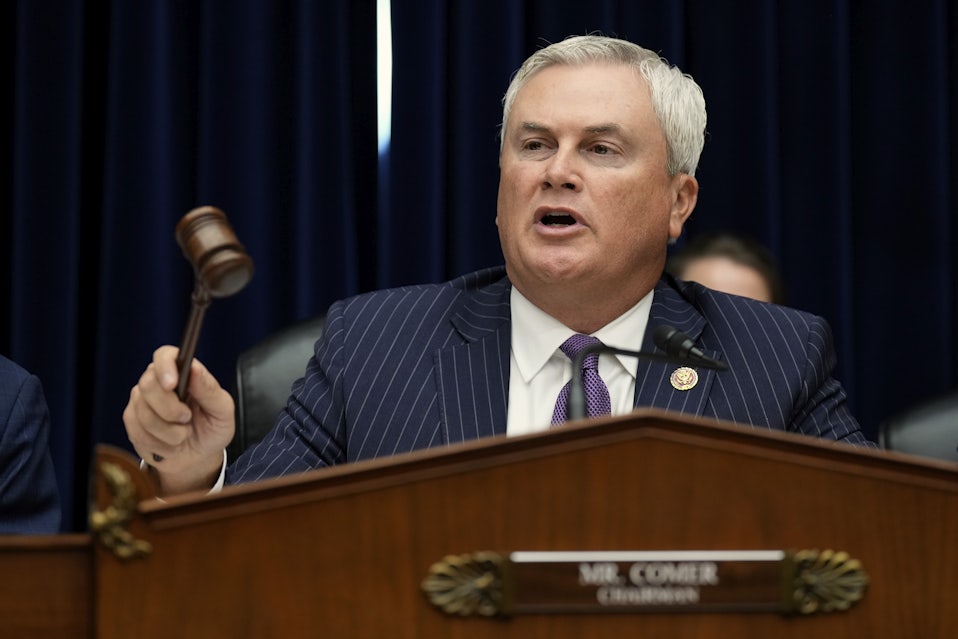- How dumb fascists can be dangerous, re: the Biden impeachment hearing;
- About The Shepherd of Hermas, an obscure Christian text, once popular, now forgotten;
- Why Trump wants Gen. Milley to be killed, and Trump’s belief in his superior genes;
- David French on why Trump Fever Won’t Break (it’s all about the human propensity to tribalism and mysticism).
So how’s that impeachment hearing going?

The New Republic, Michael Tomasky, 29 Sep 2023: Impeachment Hearing Proves Even Dumb Fascists Can Be Dangerous, subtitled “The House Republican effort to make a case against Joe Biden is mostly blundering—but their collective face-plant can still cause some significant damage.”
A common refrain on the broad left has gone something like: “Well, Donald Trump may be a fascist, but at least we can take solace in the fact that he’s stupid, because imagine the damage he could do if he were smart.” And that is true to some extent; one big reason we worry so much about the prospect of a second Trump presidency is that he now knows things that eluded him the first time he took office, potentially making him much more dangerous.
On the other hand, let’s not forget: Trump taught us from 2017 to 2021 that fascist and stupid can be plenty bad. And this week, House Republicans are drilling the same lesson into our weary heads, maybe even more emphatically than Trump did. Day one of their impeachment hearing was … well, words nearly fail me. One was repulsed by the obvious and blatant lies, yet simultaneously amazed at just how dumb these people seem to be.
Of course, Trump has been saying stupid things for years, over and over, yet still has tens of millions of followers.
\\
It’s moderately well known that there were early religious writings that might have been included in the original version of the Bible (circa 300 AD) but were not. Here’s a less well-known example.

The Conversation, Chance Bonar, 26 Sep 2023 (via): This Christian text you’ve never heard of, The Shepherd of Hermas, barely mentions Jesus − but it was a favorite of early Christians far and wide
People usually think about the Bible as a book with a fixed number of texts within its pages: 24 books in the Jewish version of the Bible; 66 for Protestants; 73 for Catholics; 81 if you’re Ethiopian Orthodox.
Writings that didn’t make it into the Bible, on the other hand, are often called “apocrypha,” a Greek term that refers to hidden or secret things. There are hundreds of apocryphal Jewish and Christian texts that, for one reason or another, were not included in different versions of the Bible. Some simply fell out of use. Some caused theological headaches for later Jews or Christians, and some were rejected because of their author – for supposedly not having really been written by an apostle, for instance. (When used with a capital “A,” Apocrypha refers to a handful of books included in the Catholic and Orthodox versions of the Old Testament, but not most Protestant ones.)
We needn’t go into details to realize that those people who believe the Bible is the unerring Word of God are naive, even simple-minded, at best uneducated, or misinformed. (The last thing religious leaders want is for their flocks to understand the history of the Bible.) It makes life easy to believe that, because you don’t have to think! The answers are right there in the Word of God, and never mind the two millennia of historical details of edits and translations and selections and omissions that went into creating our modern version of the unerring Word of God. (My favorite example: there are four gospels because of numerology: four directions on the compass. Thus other gospels were ignored or forgotten. All these decisions were made circa 300 AD, long after all the events of the New Testament. That is: church politics.)
But here’s a particular example and I’ll quote just a bit to gather the idea of what it was about, in terms of the claims in the essay’s title.
The Shepherd of Hermas was written sometime between 70–140 C.E. and takes place on the road between Rome and Naples. Hermas, who is presented as the text’s author and narrator, has various encounters with two divine figures called the Church and the Shepherd, who give him commandments and visions that he is instructed to share with other believers.
…
Given that the Shepherd is a long, rambling text that doesn’t explicitly mention Jesus, you might assume that it was only read by a small number of early Christian theologians. This, however, isn’t the case.
The Shepherd became one of the most popular texts among Christians for the first five centuries C.E. Even today, there are more surviving manuscripts of the Shepherd from antiquity than of any New Testament text except for the Gospels of Matthew and John.
And so on.
\\\
Following up on an earlier item…

Salon, Chauncey DeVega, 27 Sep 2023: The real reason why Donald Trump wants Gen. Milley to be killed, subtitled “Donald Trump’s fascist death threats against Gen. Milley: The rot goes much deeper.”
Donald Trump is continuing to threaten the lives of his “enemies” and all others who oppose him. Trump has been doing this publicly and without contrition, pause or any apparent fear of repercussions or negative consequences. His behavior is a function of his depraved character, damaged personality, and diseased mind.
Despite how too many among the news media and political class, even after seven years of experience to the contrary, would like to believe, Trump is not going to pivot. Moreover, there are no “responsible” senior members of today’s Republican Party who are going to place country over party to finally stop Trump and his neofascist MAGA movement.
… …
Here is what Trump said in a Friday post on his Truth Social disinformation propaganda website: [ … ] Of course, Trump is lying about these events. So what is the real reason why Donald Trump wants Gen. Milley to be killed?Trump is enraged that Gen. Milley attempted to stop his coup and other attacks on democracy and civil society. Milley, as a responsible military officer, places loyalty to the Constitution and democracy and the American people over personal loyalty to the person who happens to occupy the White House. This was antithetical to Trump’s attempts, and now future plans, to be America’s first dictator.
And this key comment:
Like other white supremacists, eugenicists, and racial authoritarians, Trump is very proud of his “good genes”, believes that human beings can be bred like horses, and is contemptuous towards for those he views as being somehow inferior to his “superior” racial stock.
Actually I think it’s giving Trump too much credit to say he’s scheming to become a dictator. He’s an ego-maniacal psychopath who thinks he can get away with whatever he wants, by saying whatever he wants, because there is a sizeable portion of the American population that believes him and let’s him get away with whatever he wants. Which implicates *them*, and perhaps human nature more broadly (and humanity’s ability to survive in a world that will require rationality to solve existential problems). The article ends:
The potential and reality of right-wing political violence in America as part of a plan to end multiracial pluralistic democracy is not some type of unknown unknown or mystery. The immediate question is, what to do about it?
As I and others have repeatedly implored, Democrats, liberals, progressives, Black and brown people, women, the LGBTQI community, and all others who believe in real democracy must vote and organize and resist like their lives and freedom literally depend upon it – because it does.
Is this alarmism? I wish it will turn out to have been so.
\\\

One more piece for today, along these lines.
NY Times, Opinion, David French, 1 Oct 2023: One Reason the Trump Fever Won’t Break
He writes about Christian nationalism and how it works. He discusses various approaches to understanding this, intellectual approaches completely at odds with MAGA’s emotional approach.
There are differences, for example, among Catholic integralism, which specifically seeks to “integrate” Catholic religious authority with the state; Protestant theonomy, which “believes that civil law should follow the example of Israel’s civil and judicial laws under the Mosaic covenant”; and Pentecostalism’s Seven Mountain Mandate, which seeks to place every key political and cultural institution in the United States under Christian control.
But walk into Christian MAGA America and mention any one of those terms, and you’re likely to be greeted with a blank look. “Actual Christian nationalism,” Kidd argues, “is more a visceral reaction than a rationally chosen stance.” He’s right. Essays and books about philosophy and theology are important for determining the ultimate health of the church, but on the ground or in the pews? They’re much less important than emotion, prophecy and spiritualism.
And,
Several weeks ago, I wrote about the “rage and joy” of MAGA America. Outsiders see the rage and hatred directed at them and miss that a key part of Trump’s appeal is the joy and fellowship that Trump supporters feel with each other. But there’s one last element that cements that bond with Trump: faith, including a burning sense of certainty that by supporting him, they are instruments of God’s divine plan.
For this reason, I’ve started answering questions about Christian nationalism by saying it’s not serious, but it’s very dangerous. It’s not a serious position to argue that this diverse, secularizing country will shed liberal democracy for Catholic or Protestant religious rule. But it’s exceedingly dangerous and destabilizing when millions of citizens believe that the fate of the church is bound up in the person they believe is the once and future president of the United States.
That’s why the Trump fever won’t break. That’s why even the most biblically based arguments against Trump fall on deaf ears. That’s why the very act of Christian opposition to Trump is often seen as a grave betrayal of Christ himself. In 2024, this nation will wrestle with Christian nationalism once again, but it won’t be the nationalism of ideas. It will be a nationalism rooted more in emotion and mysticism than theology. The fever may not break until the “prophecies” change, and that is a factor that is entirely out of our control.
This tendency toward tribalism and mysticism is part of human nature, and will never go away. And it might well break down the modern world that has been built on reason, evidence, and rationality, over the past couple centuries. Human civilization has been an intermittent case of two steps forward, one step back; or sometimes three steps forward, ten steps back. The forces of tribalism and mysticism and ideology drag us back.





